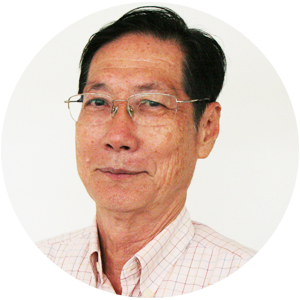
Writer: Rojana Manowalailao, ASEAN Sustainable Agrifood Systems
To reduce chemicals used in agriculture, biocontrol agents must be promoted. This ongoing discussion has been dragged on over time, but yet it has not gone far.
Four participants who recently attended the 3rd Drafting Meeting of the ‘National Action Plan for the Implementation of Biocontrol in Thailand’ in Bangkok shared their experiences and ideas how they think biological control inputs can be widely used in the country.
 Mr. Boonhiang Promdonkoy, Researcher from the National Center for Genetic Engineering and Biotechnology (BIOTEC)
Mr. Boonhiang Promdonkoy, Researcher from the National Center for Genetic Engineering and Biotechnology (BIOTEC)
“To increase the use of biocontrol crop protection products, it has to start from consumers. Many farmers told me that they do not want to use chemical products on their crops and land. For family consumption, they avoid using chemicals in their vegetables. But, when it comes to commercial purposes, it seems farmers are left with few options. When consumers prefer flawless quality of vegetables, farmers have to apply a large volume of chemicals to make sure the crop pests are completely wiped off. Farmers usually act according to the market demand. Consumers must understand that a few worms on the vegetables or holes on the leaves mean safe food. Biological control products can get rid of 70 to 90 per cent of pests and it is common. So, when consumers change to the green consumption, farmers will change to the green production. Farmers will do more organic farming and use more bio input products when consumers can accept the not-nicely-looking vegetables.
Farmers who do organic farming need help with market linkages in finding their new customers. Their chance is small in putting their organic products at a high-end super market where a demand of the organic products is usually high. Somebody needs to strategically take this role of filling a gap to connect the organic farmers with organic consumers.
Besides, government must strongly enforce the law. Government must strictly ban the hazardous chemicals and strictly impose penalties on those violate. A present situation is some chemical products which are branded prohibited still can be easily found in the market. In addition, the standard and practices of quality control and assurance of organic product must be reexamined. Sometimes, we do a random sampling of organic vegetables at the supermarket, and find chemical residues in the vegetable. When vegetables are marked chemical free, they should be ‘chemical free’, not more or not less.”
“When consumers change to the green consumption, farmers will change to the green production.”
 Mrs. Areepan Upanisakorn, Chief of Biological Control Promotion Group, Department of Agricultural Extension (DOAE)
Mrs. Areepan Upanisakorn, Chief of Biological Control Promotion Group, Department of Agricultural Extension (DOAE)
“A comprehensive knowledge on biocontrol crop protection must be transferred to farmers. We have a farmer field school in every district of Thailand, which is counted to 882 schools altogether, and offer a course for 30 farmers at each school per year. However, we wish to do more, but are in short of supporting funds.
A course for rice farmer, for example, takes four months corresponding for the rice growth stage, and for vegetable growers the course takes two months upon the vegetable cycle. Farmers come to the class one to two times a week, and we provide lunch, and transportation fees for incentive because they cannot obtain their income while taking time attending the class.
Farmers, to use bio input product effectively, need to know the types of crop pests they encounter in every day’s lives and a whole cycle of crop pest to determine what products to use, when, and how. They have to learn about costs, how much they spend on the biological control products in each production cycle including their labor cost. Attending the farmer field school will allow them opportunities to learn the complete knowledge and earn practical experiences in the demonstration plot while making their own decisions of how to manage the plot and make it profitable. At the end farmers can compare the results in using biocontrol products in integrated pest management with chemicals at their traditional practices.
Farmers must be able to compare and they will make their own decisions if they will use the bio input products. Giving them free products for a trail and they would say ‘yes, it is good’ is not a sustainable way. They use it because they get it for free but it is more about how we can do to make them seeing the benefits, encouraging them to continue using it, and getting interested to acquiring it whether to produce those they can, and buy those they cannot.”
“Farmers must be able to compare and they will make their own decisions”
 Mr. Winai Rushtapakornchai, Development Manager of Thep Watana Co., LTD (Importer and distributor of biocontrol crop protection products)
Mr. Winai Rushtapakornchai, Development Manager of Thep Watana Co., LTD (Importer and distributor of biocontrol crop protection products)
“Biocontrol crop production products must be of high quality, reliable, and affordable in order to compete with chemicals, and it can take time to improve the products to a certain standard and also build trust in farmers.
I have been in this bio input field for over forty years and I see a repeated cycle. In the early days, the biocontrol technology was limited, and the product is quite expensive and not effective. And, farmers have been losing trust in the biological products, besides the facts that they prefer a quick action in chemical products. This information has been passed from a generation to a generation, and farmers have had this belief stuck in their mind. These days although the quality of biocontrol crop protect products have been improved greatly in terms of efficacy, quick action, and cost reduction, but farmers are so used to the traditional practice of applying chemical products and particularly in favor of their strong effects on pest control. Farmers will stop using chemicals only when pests become resistant. For a little while, they will switch for biological control products while looking for a newly produced chemical product for replacement until pests become resistant again.
Promoting the use of bio control product is very necessary and it has to be pushed harder and more continuingly. In the meantime, the biocontrol production technology must be improved and steadily developed in terms of scale and formulation. The products must be more efficacious, reliable, and user friendly, while giving quick results, and affordable. Farmers are afraid of change particularly when there is no guarantee in terms of yield, income, and cost of investment.”
“Biocontrol crop production products must be of high quality, reliable, and affordable.”
 Ms. Porapa Nitkosakul, Marketing Manager of Appliedchem (Thailand) Co., LTD (Producer, distributor, and exporters of biocontrol crop protection products for over 20 years)
Ms. Porapa Nitkosakul, Marketing Manager of Appliedchem (Thailand) Co., LTD (Producer, distributor, and exporters of biocontrol crop protection products for over 20 years)
“Government must put the use of biocontrol crop protection as a national agenda. It has to come from top down in equipping suitable environment for organic farming and green consumption society. The old generation farmers are used to using chemicals in agriculture. Some of them may not know about organic farm and for those who do they perhaps have a wrong perception that using biological control products are expensive and not effective. If it is put into the national agenda, local administers will better engage farmers in the use of biocontrol products and farmers will have a better understanding and knowledge on organic farming.
Government should assign a zone particularly for organic production in certain areas and communities to be able to conveniently provide supports in biocontrol input in terms of supplies, milling, logistics, and knowledge transfer. Government can create schemes, one of which is ‘One District: One Organic Product’, for instance, and offer special loans for farmers who wish to do organic farming including finding them the market to sell the organic products. Besides, government can help link the group of organic farmer to processing factories in order to increase the market size.
Farmers will be willing to change if they can make a good living from the organic farm. But, they need supports from government.”
“Farmers will be willing to change if they can make a good living from the organic farm. But, they need supports from government.”
‘The 3rd Drafting Meeting of the ‘National Action Plan for the Implementation of Biocontrol in Thailand’ was organised by ASEAN Sustainable Agrifood Systems on 19 April 2016 in Bangkok, and attended by 40 public and private individuals from Department of Agriculture, Department of Agriculture Extension, Rice Department, National Center for Genetic Engineering and Biotechnology, universities, and private companies. The aim was to exchange and discuss for ideas in drafting the national action plan for the implementation of biocontrol inputs in Thailand.